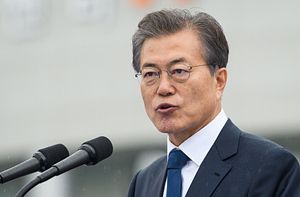On Wednesday, reports surfaced that South Korea may soon launch a new committee to further boost the country’s economic ties with ASEAN and India. The development has once again put the spotlight on the development of the ‘New Southern Policy’ under President Moon Jae-in.
As I have noted before in these pages, one of the Moon administration’s initial foreign policy priorities since he came to office last year was a ‘New Southern Policy’ that would involve deepening relations with India as well as the countries of Southeast Asia, including in the economic realm. Though the idea itself was not new, the momentum behind it has been quite significant thus far in spite of lingering concerns about its future trajectory through the rest of Moon’s term in office (See: “What Does Moon’s Southern Policy Mean for ASEAN-South Korea Ties?”).
Progress on the ‘New Southern Policy’ has continued in recent months. Indeed, just earlier this month, Moon paid a visit to India and Singapore, which also holds the annually rotating ASEAN chairmanship this year, in a clear effort to boost the initiative still further. Both legs of the visit saw advancements on the economic side of the relationship, with notable developments in areas such as trade, investment, and advancing commercial relationships.
This week saw Seoul attempt to highlight yet another development within this context. On Wednesday, according to local media reports, presidential office spokesman Kim Eui-kyeom told reporters that South Korea would soon launch a new committee to further boost economic ties with ASEAN and India. The new body, billed the New Southern Economic Committee, would be established as a special committee within the Presidential Commission on Policy Planning.
Few specifics have been publicly released so far about the body. Reports suggested it would be headed by Kim Hyun-chul, a special economic adviser to Moon, and that more details, including the size and composition of the committee, would be decided and disclosed later. Those specifics will no doubt be important in evaluating its significance in terms of actual policymaking.
To be sure, this is just one of several developments tied to the evolution of the New Southern Policy, and South Korean officials have said that more will be unveiled through the rest of 2018 and into 2019 as well. Nonetheless, as the Moon administration continues to build out its foreign policy, such potential advances will remain important to watch to assess the opportunities and the challenges that they afford.
































